In the Face of Adversity
15 November
As we get to the end of the calendar year, I'm also getting to the end of my holiday year and so I'm taking time off to ensure that I don't lose any precious downtime.
In the last few years, I've been down to London for a couple of art shows, journeyed round the country for a mini opera festival and constructed a pond in the back garden.
This year, I've started the break with a quick spurt of three operas in three nights simply because of the way that the programming has fallen.
The first evening should have been counted as a disaster. The last time that I journeyed to Stoke for a performance by Glyndebourne Touring Opera in November 2002, I was so unimpressed by the evening that I remarked that I was going to take some persuading before I ventured that far again for that company.
Well the lure on this occasion was a performance of Janacek's Jenufa in a production which I'd seen a couple of times before. Firstly, in 1989 at the Glyndebourne Festival itself and then on tour in Manchester in 1991. I also have a version on DVD. So, you can gather that this was an event for which I had high hopes.
I went with Roland and everything surrounding the performance itself went dreadfully, dreadfully wrong. Here is the catalogue:-
- We decided to go via Runcorn to avoid the Thelwall viaduct and hit a traffic jam caused by roadworks which delayed us for some 40 minutes
- We drove through torrential rain which turned the M6 into a floodplain, prevented conversation through the sheer noise of the rain drumming on the car's bodywork and reduced visibility to mere yards
- Our extended journey meant that we did not go for a friendly pint in a pub which Roland had been looking forwards to re-visiting
- Our evening meal in a (so-called) Italian restaurant was over-priced, poorly presented, lacking in taste and took place in an ambiance which was redolent of the 1950s
- We encountered an early evening street parade of children and Santas celebrating the turning on of Stoke's Christmas street lights - this on Thursday 12 November
- Some seven years after my last visit, the theatre still has very poor facilities for its audience and retains the charm of a 1960s municipal outhouse
- The performance had to be halted after 20 seconds and re-started some ten minutes later because the curtain had jammed on its way up
- The interval was extended from 30 minutes to an announced 40 minutes which became 50 minutes in actual fact presumably because there were problems with the back stage facilities
- We encountered a late evening street parade of students engaged in a pub crawl organised by Carnage UK
In most other circumstances, I would have given up well before the list grew to that length. And had I turned back at Runcorn, I would have missed one of the great operatic nights of my life. I was completely wrung out emotionally by the truth of what was presented via the stage and the pit. I last heard Robin Ticciati conduct in January of this year at the Phil. On that occasion, I was not impressed. This performance was much better prepared. There was real bite and rhythmic drive. Occasionally the brass overwhelmed the voices but I suspect that that is Janacek's fault. But in terms of pace and orchestral colouring this was a very good piece of work.
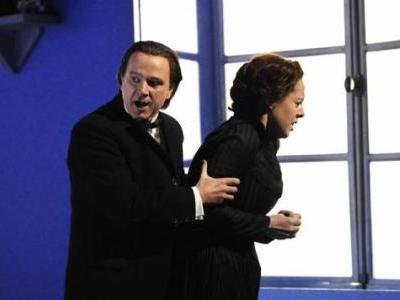 What took the evening onto another dimension was the performances on stage. I've not always been a fan of Giselle Allen but she is a performer who has grown on me. I didn't like her work in The Cunning Little Vixen or Rusalka. Her performance as Ellen Orford in Peter Grimes, however, was excellent. On this showing as Jenufa, she has developed even further as a singing actor. Peter Wedd took the rôle of Laca. Again, it is fascinating to have watched his career grow through a variety of rôles in The Magic Flute, Don Giovanni, La Traviata and The Magic Flute for a second time. As the decade has progressed, so his voice has grown and his artistry has developed.
What took the evening onto another dimension was the performances on stage. I've not always been a fan of Giselle Allen but she is a performer who has grown on me. I didn't like her work in The Cunning Little Vixen or Rusalka. Her performance as Ellen Orford in Peter Grimes, however, was excellent. On this showing as Jenufa, she has developed even further as a singing actor. Peter Wedd took the rôle of Laca. Again, it is fascinating to have watched his career grow through a variety of rôles in The Magic Flute, Don Giovanni, La Traviata and The Magic Flute for a second time. As the decade has progressed, so his voice has grown and his artistry has developed.
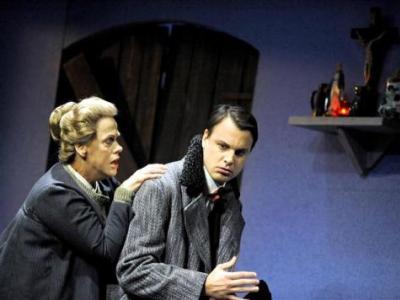 Of the principles, only Pavel Cernoch as Steva was new to me and I would certainly look out for him again. Not only did he sound right but he looked good enough to have the girls swooning over him. Susan Gorton as the Grandmother is a real trouper and I have already celebrated her work in Cavalleria rusticana, Maria Padilla, La vida breve and Albert Herring.
Of the principles, only Pavel Cernoch as Steva was new to me and I would certainly look out for him again. Not only did he sound right but he looked good enough to have the girls swooning over him. Susan Gorton as the Grandmother is a real trouper and I have already celebrated her work in Cavalleria rusticana, Maria Padilla, La vida breve and Albert Herring.
Best performance of the evening by far, even among a generally excellent cast, was given by Anne Mason as the Kostelnicka. I had only seen her perform on one previous occasion in the title rôle of Donizetti's Mary Stuart with English Touring Opera. She made Act Two truly harrowing. She showed us a good woman being met by a series of challenges which led her to the point where the only next logical thing to do was to kill her bastard infant grandchild. And I believed every moment of it. I'm torn between whether to say that this performance was superb ![[Four and a Half Stars - Superb]](4_5star.jpg) or whether to say that it was outstanding
or whether to say that it was outstanding ![[Five Stars - Outstanding]](5star.jpg) but it was certainly that good.
but it was certainly that good.
I was so glad that I didn't have to go into work the following morning. It was an easier drive back but I felt decidedly flaky on the day after.
And then it was to the Lowry for Cosi fan tutte. And another drive in torrential rain but on my own this time. And I hit a traffic jam just outside Warrington. And I nearly turned back but I didn't.
It would be lovely to say that I was rewarded two nights running but I wasn't.
I have some general rules when booking my operatic performances and I broke three of them when I bought my tickets for this performance. I try to book to see works that either I haven't seen before or I haven't seen for a long time - I saw a very good Cosi in Glasgow back at the end of May this year. I try to book for the work rather than the performer - I've tried to catch Rolando Villazón twice now in L'elisir d'amore and Les Contes d'Hoffmann and he has cancelled both times. On this occasion, I used the fact that the young tenor Allan Clayton was performing as my spur and, of course, he cancelled. I also try to avoid completeism - having to see everything in the week's repertory and I failed here as well as this performance was the extra one added in to make the complete set.
Well, my spirits sank with the overture. Justin Doyle took over as second string conductor from Andrew Parrott but no doubt took his cue from his mentor. All the tempi were dragged about. The fast speeds were very fast; the slow speeds very slow. And so it went on. I do understand that tempi in historically informed performances are different from those which became usual by the mid-twentieth century. However, I suspect that Mozart wanted a balanced contrast rather than a constant feeling of stop-go.
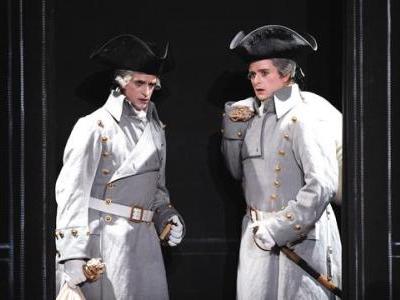 I wasn't all that happy with the production either. I'm all for underlining the aspect of the work which chimes with the Age of Reason rational enquiry into human nature. However, the opera is about passion and human frailty. It is a hot work. It is set in Naples for a reason. To have everything presented in a cold blue light with no sense of indoors and outdoors did not help.
I wasn't all that happy with the production either. I'm all for underlining the aspect of the work which chimes with the Age of Reason rational enquiry into human nature. However, the opera is about passion and human frailty. It is a hot work. It is set in Naples for a reason. To have everything presented in a cold blue light with no sense of indoors and outdoors did not help.
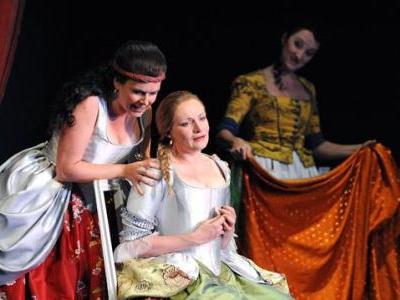 Geoffrey Dolton had been the best thing about Welsh National Opera's The Merry Widow back in 2005. It was probably the same here too. Elizabeth Atherton and Victoria Simmonds were OK as the two sisters - just not outstanding. Amy Freston was fine as Despina, Quirijn de Lang was OK as Guglielmo and Allan Clayton's stand in was (perhaps understandably) tentative.
Geoffrey Dolton had been the best thing about Welsh National Opera's The Merry Widow back in 2005. It was probably the same here too. Elizabeth Atherton and Victoria Simmonds were OK as the two sisters - just not outstanding. Amy Freston was fine as Despina, Quirijn de Lang was OK as Guglielmo and Allan Clayton's stand in was (perhaps understandably) tentative.
I left at the interval. I was in bed before curtain down. It was all very reasonable but I shouldn't have booked in the first place.
![[Two and a Half Stars - Reasonable]](2_5star.jpg)
I slept long and late on Saturday, chilled all morning, met up with Roland for a pint and a chat in the afternoon and then made my way to the Lowry for my third opera in three nights. This time the journey was clear and the work was one that I had not seen in the theatre for over twenty-five years.
I'm glad that I've touched base with Massenet's Werther once again. I hope that I don't have to wait another twenty-five years for another go at it. However, I shan't be in too much of a hurry to make the effort.
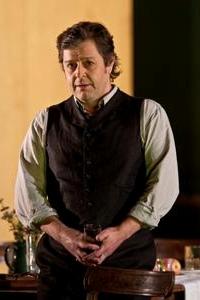
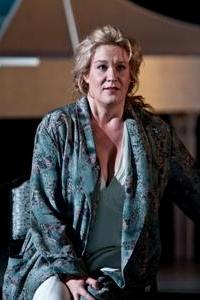 Musically, the evening was fine. Richard Farnes conducted a beautifully judged performance allowing some delightful orchestral colours to come through. Alice Coote amply justified her publicity with a powerfully sung and generously acted performance. It was all much better than her appearance in ENO's dreadful Carmen of two years ago.
Musically, the evening was fine. Richard Farnes conducted a beautifully judged performance allowing some delightful orchestral colours to come through. Alice Coote amply justified her publicity with a powerfully sung and generously acted performance. It was all much better than her appearance in ENO's dreadful Carmen of two years ago.
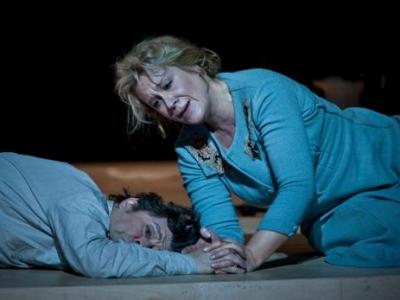 Paul Nilon is a sympathetic and versatile performer. You can see this from the range of rôles I've seen him perform over the past decade or so - Ottavio in Don Giovanni, Quint in The Turn of Screw, Cinna in La Vestale, Mischa in Julietta, the title rôle in Der Zwerg, Pylade in Iphigénie en Tauride and the title rôle in The Fortunes of King Croesus. Werther, however, is not a natural rôle for him and, although he gave it his best shot, it was a case of applauding the artistry rather than the assumption. I liked Fflur Wyn and Grant Doyle as Sophie and Albert. Donald Maxwell added another cracking cameo the long list of his appearances on the operatic stage.
Paul Nilon is a sympathetic and versatile performer. You can see this from the range of rôles I've seen him perform over the past decade or so - Ottavio in Don Giovanni, Quint in The Turn of Screw, Cinna in La Vestale, Mischa in Julietta, the title rôle in Der Zwerg, Pylade in Iphigénie en Tauride and the title rôle in The Fortunes of King Croesus. Werther, however, is not a natural rôle for him and, although he gave it his best shot, it was a case of applauding the artistry rather than the assumption. I liked Fflur Wyn and Grant Doyle as Sophie and Albert. Donald Maxwell added another cracking cameo the long list of his appearances on the operatic stage.
I was less happy with the production. I do wish that Hildegard Bechtler would get over presenting us with unadorned plywood surfaces. I'm all for simplicity and I'm happy to use my imagination but a plywood box for a house just screams attention seeking.
The costumes were lovely but the period have been moved from the late 18th Century to the 1920s. I could find no reason for this and it set up an uncomfortable resonance. Though not specifically stated, we were in Germany during the Weimar Republic. I sat through the piece just waiting for the politics of the period to be made explicit - either for Albert to return home in the Third Act wearing the uniform of one of Ernst Röhm's blackshirts or for Werther's flat in the final scene to be daubed with a yellow star of David. Neither thing happened and maybe that was the point but I found it a distraction. So, mostly good though not great.
![[Three Stars - Good]](3star.jpg)
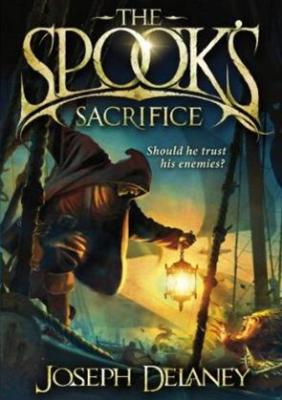 I've polished off a couple of books. The Spook's Sacrifice continues the good work on this series for younger readers.
I've polished off a couple of books. The Spook's Sacrifice continues the good work on this series for younger readers.
![[Three Stars - Good]](3star.jpg)
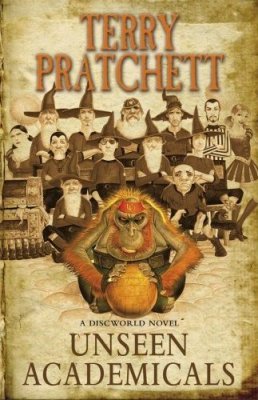 Similarly, Unseen Academicals continues the good work on a series for slightly older readers with a youngish frame of mind.
Similarly, Unseen Academicals continues the good work on a series for slightly older readers with a youngish frame of mind.
![[Three Stars - Good]](3star.jpg)
Over on Radio Four, we have now completed a classic serial of Maupassant's Bel Ami and have just begun another two parter today based on H E Bates's Fair Stood the Wind for France.
Over on television, Trinity has finished its run and, pray God, will never return. Spooks is with us for an eighth season and Beautiful People is back for a second and HUZZAHH!!! it's still exceptionally funny. True Blood continues to be both Gothic and stylish. However, the surprise hit is Flash Forward. This is in the tradition of Lost, Prison Break and Heroes in which a mystery is unravelled over the course of a whole year rather than telling a tale through a series of self-contained stories. The granddaddy of all of these is, of course, Twin Peaks.

I just hope that this series has learnt the lesson of the other four and has enough plot to keep it going beyond a first series. Let's face it, this type of show tends to disappear up its own arse during a second, elongated series full of plots which do nothing but tread water.
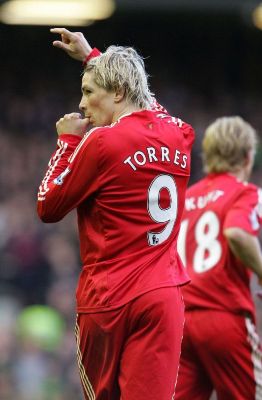 Meanwhile, in the world of football, it has been announced that Fernando Torres is suffering from a groin strain.
Meanwhile, in the world of football, it has been announced that Fernando Torres is suffering from a groin strain.
I have let it be known that I can sacrifice myself and deliver some deep tissue massage if he requires it.
In his last outing for Liverpool FC, he communicated his response to me using our secret language of mime and gesture. This photograph captures the moment when he told me that he will offer me a blow job if I kiss his right buttock and massage a spot 2cm inside his rectum.
I have treated this saucy communiqué with the contempt it deserves.
 What took the evening onto another dimension was the performances on stage. I've not always been a fan of Giselle Allen but she is a performer who has grown on me. I didn't like her work in The Cunning Little Vixen or Rusalka. Her performance as Ellen Orford in Peter Grimes, however, was excellent. On this showing as Jenufa, she has developed even further as a singing actor. Peter Wedd took the rôle of Laca. Again, it is fascinating to have watched his career grow through a variety of rôles in The Magic Flute, Don Giovanni, La Traviata and The Magic Flute for a second time. As the decade has progressed, so his voice has grown and his artistry has developed.
What took the evening onto another dimension was the performances on stage. I've not always been a fan of Giselle Allen but she is a performer who has grown on me. I didn't like her work in The Cunning Little Vixen or Rusalka. Her performance as Ellen Orford in Peter Grimes, however, was excellent. On this showing as Jenufa, she has developed even further as a singing actor. Peter Wedd took the rôle of Laca. Again, it is fascinating to have watched his career grow through a variety of rôles in The Magic Flute, Don Giovanni, La Traviata and The Magic Flute for a second time. As the decade has progressed, so his voice has grown and his artistry has developed.
 Of the principles, only Pavel Cernoch as Steva was new to me and I would certainly look out for him again. Not only did he sound right but he looked good enough to have the girls swooning over him. Susan Gorton as the Grandmother is a real trouper and I have already celebrated her work in
Of the principles, only Pavel Cernoch as Steva was new to me and I would certainly look out for him again. Not only did he sound right but he looked good enough to have the girls swooning over him. Susan Gorton as the Grandmother is a real trouper and I have already celebrated her work in  I wasn't all that happy with the production either. I'm all for underlining the aspect of the work which chimes with the Age of Reason rational enquiry into human nature. However, the opera is about passion and human frailty. It is a hot work. It is set in Naples for a reason. To have everything presented in a cold blue light with no sense of indoors and outdoors did not help.
I wasn't all that happy with the production either. I'm all for underlining the aspect of the work which chimes with the Age of Reason rational enquiry into human nature. However, the opera is about passion and human frailty. It is a hot work. It is set in Naples for a reason. To have everything presented in a cold blue light with no sense of indoors and outdoors did not help.
 Geoffrey Dolton had been the best thing about Welsh National Opera's
Geoffrey Dolton had been the best thing about Welsh National Opera's 
 Musically, the evening was fine. Richard Farnes conducted a beautifully judged performance allowing some delightful orchestral colours to come through. Alice Coote amply justified her publicity with a powerfully sung and generously acted performance. It was all much better than her appearance in ENO's dreadful
Musically, the evening was fine. Richard Farnes conducted a beautifully judged performance allowing some delightful orchestral colours to come through. Alice Coote amply justified her publicity with a powerfully sung and generously acted performance. It was all much better than her appearance in ENO's dreadful  Paul Nilon is a sympathetic and versatile performer. You can see this from the range of rôles I've seen him perform over the past decade or so - Ottavio in
Paul Nilon is a sympathetic and versatile performer. You can see this from the range of rôles I've seen him perform over the past decade or so - Ottavio in  I've polished off a couple of books. The Spook's Sacrifice continues the good work on this series for younger readers.
I've polished off a couple of books. The Spook's Sacrifice continues the good work on this series for younger readers.
 Similarly, Unseen Academicals continues the good work on a series for slightly older readers with a youngish frame of mind.
Similarly, Unseen Academicals continues the good work on a series for slightly older readers with a youngish frame of mind.

 Meanwhile, in the world of football, it has been announced that Fernando Torres is suffering from a groin strain.
Meanwhile, in the world of football, it has been announced that Fernando Torres is suffering from a groin strain.